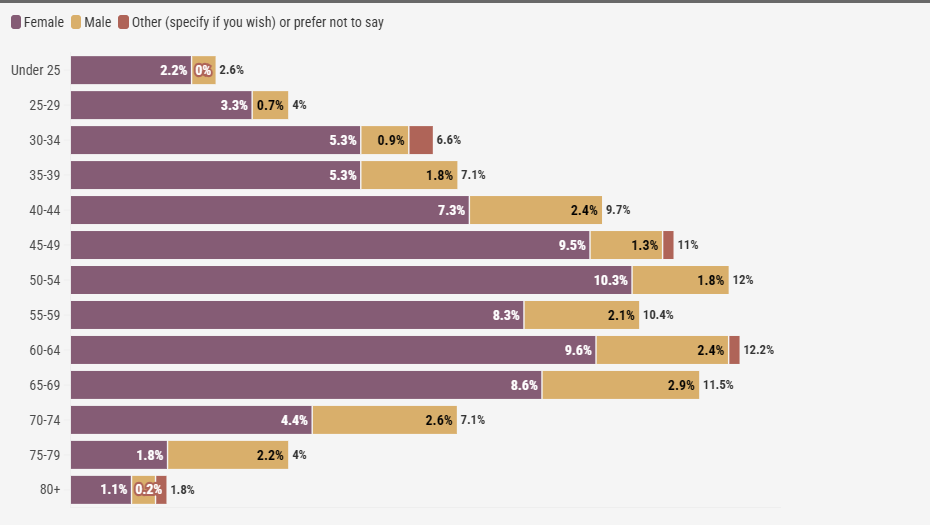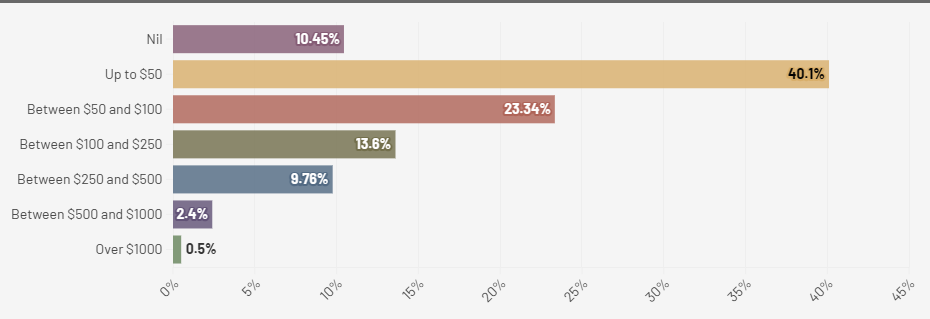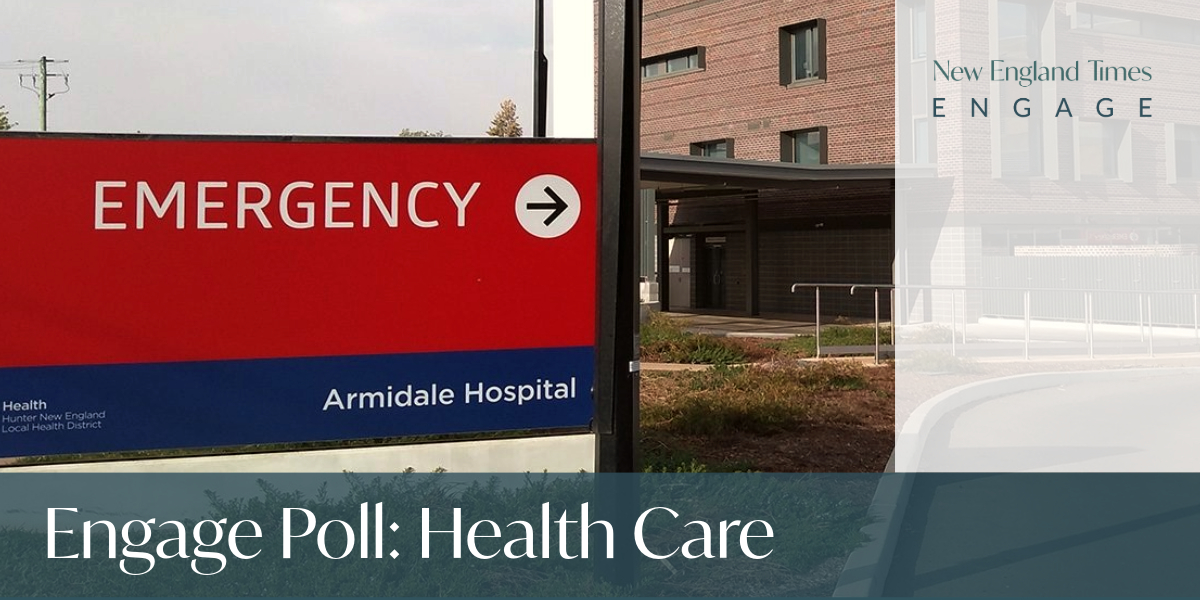Health is always an emotive issue in the New England, so it is not surprising that there was some serious and anger and pain in the responses to this Engage Poll.
452 New England Times readers and locals from the KORE Panel participated in our survey on the health, 78% women and 21% men – which is a very typical gender balance when asking about health – with a good age spread from 16 to 90. Health surveys are routinely biased towards older women as men (still!) aren’t as comfortable talking about their health, and the older you get the more it is an issue you care about, but this is still a decent sample.

67% said they have at least one chronic or long term health condition (and apologies for the error in this question that prevented people from checking multiple disorders), with migraine, mental health, heart conditions, and chronic pain being the most common. 95% identified as living within the New England electorate, and the absence of men in the sample shifted the partisan leaning of the sample from our renewables poll, with just 31% saying they wanted the National and Liberal Coalition to win Government at the next election, 27.7% Labor, 32% said they didn’t know and 8.4% other.
As is the practice of the KORE Polling method, we always have a lot of open text questions to mimic the kind of extra chatter that would go around the questions if you were polling someone by phone or in person. It helps us understand the meaning behind the response, and identify when the interpretation of the question is different than intended.
What was notable about this survey is that there were lots of very long responses, with people really needing to get stuff off their chest. And that’s absolutely ok, surveys go pretty well as a cheap form of therapy – but it also tells us there’s a lot of pain in this issue.
And when we asked our usual open ended question asking people what health meant to people in a political context there was a really consistent indication of pain and failure of our health systems, with a fair amount of feeling let down and betrayed.
“They say what we want to hear to garner votes, then do absolutely nothing.”
“In my local area I have limited access to health care. Can’t get into a doctor. Hospital sends you 2-3 hours away to a referral hospital.”
“So many things come to mind. But my belief is the Australian government doesn’t want to keep paying for health care in Australia and wants to privatise it. The country is growing, more people are living longer the government doesn’t want to spend the money on our health system.”
“They don’t understand rural healthcare it’s all about the large cities.”
“All words, no action.”
“I don’t believe that most politicians, or most people who live in capital cities, understand how second-rate health care is in the bush. Moreover, I don’t think they care!”
“Health system in the country is ruined and has been for at least a decade now. They are building new hospitals but there are no Doctors to service them.”
“They have no idea of the dire state of health services in rural and regional Australia.”
“It feels like something politicians love to argue about but it’s not something I feel is genuinely thought about in a political context. Like it’s used to make a lot of promises to win votes but not something that is really fought for. Especially if it’s women’s health care.”
“The sheer lack of health care on all levels in regional NSW is appalling.”
There was a couple of comments opposition the politicisation of politics. We got this on the socials a bit too, which struck us as a little too consistent to not have a source, most likely a politician saying there’s too much politics in health care. 91% of respondents said health would be a factor in their vote decision for the upcoming federal election.
The extent to which people are unhappy was pretty clear in every question, no more starkly than in the first question about spending.
Do you think we spend too much money on health services from the federal budget, or are we spending too little?

Over three quarters say we spend too little gives a fairly clear picture. Interestingly the high ‘other’ were almost in unison that it’s not about the total spend, but the unfair and inefficient allocation of resources, wasting taxpayer dollars.
“Money is spent recklessly in the wrong areas due to bad management.”
“The spending is being pulled from regional areas into metro areas suffocating regional health services. This is true for the Hunter-New England Health Service where Hunter bleeds the regional areas dry and suffocates their abilities to provide a first world health system.”
“Not sure if the right amount is being spent but it is not reaching the rural areas.”
“Most of it seems to be spent on the wrong things. To much KPI focus and to much red tape/upper management.”
“Spend enough but its spent incredibly inefficiently.”
“The money is not well spent, some services have too much funding others are desperately underfunded, amongst the health workforce within a hospital you will see groups of people or disciplines who are run off their feet and burnt out and then there are other services that have much better funding who are taking it easy.”
There was also a lot of commentary on millions being spent on new buildings, which is great, but if there’s no doctors there then the building is useless.
Medication access
As this was a poll related to the upcoming federal election we focused our questions on the things indisputably federal in our health system – medication through the Pharmaceutical Benefits Scheme (PBS) and access to doctors funded by Medicare.
I have to declare a significant bias on this issue having been actively involved in campaigning for medication access for migraine for over 5 years now, and personally paying north of $1000 a month for medications not covered by the PBS for almost as long. But even I was genuinely shocked by the results to these questions.
Do you currently take any prescribed medications that are not subsidised by the PBS (sometimes called private scripts)?

A third of respondents have prescribed medications not covered by the PBS. Half are paying more than $50 a month on medications, and too many are paying over $250 a month for prescription medications.
How much, on average, do you currently pay for medications each month?

But cost isn’t the only problem, with almost half unable to get their medication at some point in the last 12 months due to a stock or supply issue.

Most of the ‘others’ to these questions indicated they had been unable to afford a particular medication, or that they had been unable to see a doctor to get the required script. Some commented that they might be able to afford the medication if they didn’t have to pay for the doctors appointment to get the script.
“Can be difficult I have a standard list that hasn’t changed much but still have to book regularly into GP which is difficult. Should be better options for GPs to lengthen script turnover.”
“Have to wait 2 weeks for Dr appointment, then 2 hrs in waiting room to just get a script. My specialists monitors my medicine and the GP can’t change them, so why can’t I just pick up a script at the front desk. Saves time and saves money Don’t know how people / families without a health care card can afford to go to Drs.”
“My ability to access medications is limited by my ability to access a doctor to prescribe them and the cost of that.”
GP access
Not sure these numbers need much commentary.
Are you satisfied with the availability of GPs and other primary health care services in your area?

Most of the ‘others’ said they have a GP and are ok, but they know many people who aren’t. And two thirds said they do not have access to a bulk billing GP.
Are you able to access a bulk-billed GP service in your town if you need it?

The lengths people were going to in order to access doctors was the most confronting message from the comments, as were the waits. Many of the new arrivals are still using their city doctors by telehealth, or travelling back to get care.
“We have up to a 5 year wait in Glen Innes for a Dr I have to travel 6 hours to see my old GP in Cessnock”
“Can’t get into see a doctor in Tenterfield, have to drive 45 minutes to Stanthorpe to see my doctor.”
“6-8 week wait to see a doctor is a joke and don’t want to spend up to 8 hrs sitting at a hospital to see a doctor.”
“There are doctors but they have waiting lists over 400 people waiting to get on their books.”
“I have to travel over 3 hours to see my GP and have it booked weeks in advance”
Less than 10% of New Englanders can get in to see a GP in under a week, and almost all of them are in Tamworth.
How long on average do you have to wait to see your regular GP?

We also asked a series of questions on hospital access, and needing to leave town for hospital care. These results are complex and need to be broken down in context, but in order to do that we need to wait until the people we need to talk to are back from the break – so keep an eye out for that story in a couple of weeks.
Thank you to all who participated, our next poll will be up next week on New England Times.
Don’t miss any of the important stories from around the region. Subscribe to our email list.

